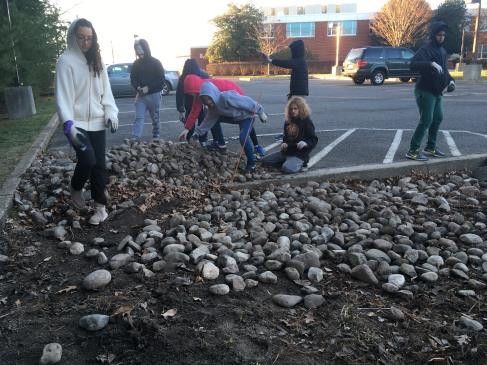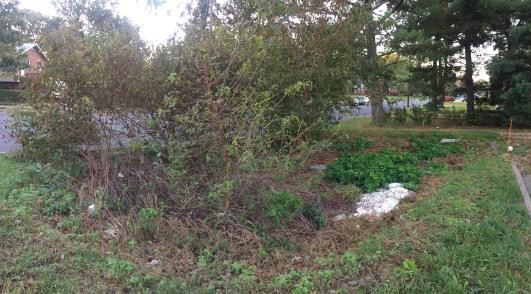2019, Fairfax, VA, USA
Students: Lauren Dick-Peddie, Elder Hernandez, Nathaniel Kirk-Popham, Maya Littman, Myles Jones
 What if there was a way to filter water of sediments and chemicals when it goes into the ground? We see that a bio- retention cell is beneficial for maintaining and improving our watershed health. In order to help, we would like to revitalize the bio-retention cell at our school. A bio-retention cell is a rain garden with a rock pit before it, which acts as barrier to collect sediment while also stopping runoff and providing water to plants. Our bio-retention cell, needs maintenance, with planting of new native species and adding rocks too. One of the results we hope to achieve is to filter out nitrites, sediment, and garbage before it reaches Virginia’s rivers and the Chesapeake Bay.
What if there was a way to filter water of sediments and chemicals when it goes into the ground? We see that a bio- retention cell is beneficial for maintaining and improving our watershed health. In order to help, we would like to revitalize the bio-retention cell at our school. A bio-retention cell is a rain garden with a rock pit before it, which acts as barrier to collect sediment while also stopping runoff and providing water to plants. Our bio-retention cell, needs maintenance, with planting of new native species and adding rocks too. One of the results we hope to achieve is to filter out nitrites, sediment, and garbage before it reaches Virginia’s rivers and the Chesapeake Bay.
When repurposing the bio-retention cell we made it our goal to involve more people than just us alone. We have over a thousand students, who can get involved through volunteering with the after school eco-club. We can reach out to this audience by advertising and promoting eco-club, emphasizing on the incentive to get involved. We will organize community service days to engage the wider community and volunteers.
 Not only do we want this project to benefit Lanier but we wish to expand this wonder all across the county. We believe that all schools should have the chance to experience and help care for our watershed. We will invite students from our feeder elementary school and volunteer form our high school as well. After all, the Chesapeake Bay is something shared of six states and we should, and will, treasure it!
Not only do we want this project to benefit Lanier but we wish to expand this wonder all across the county. We believe that all schools should have the chance to experience and help care for our watershed. We will invite students from our feeder elementary school and volunteer form our high school as well. After all, the Chesapeake Bay is something shared of six states and we should, and will, treasure it!
The bio-retention cell has many environmental benefits. It is able to take in a lot of water which helps it filter out a big amount of sediment that comes from runoff water. Since there will be a layer of rocks to prevent any litter from coming through the runoff, water pollution will be reduced. With our cell and hopefully more to come, not only does it reduce the amount of trash getting into our bay, but it also reduces other pollutants such as road salt, sediment and animal feces.